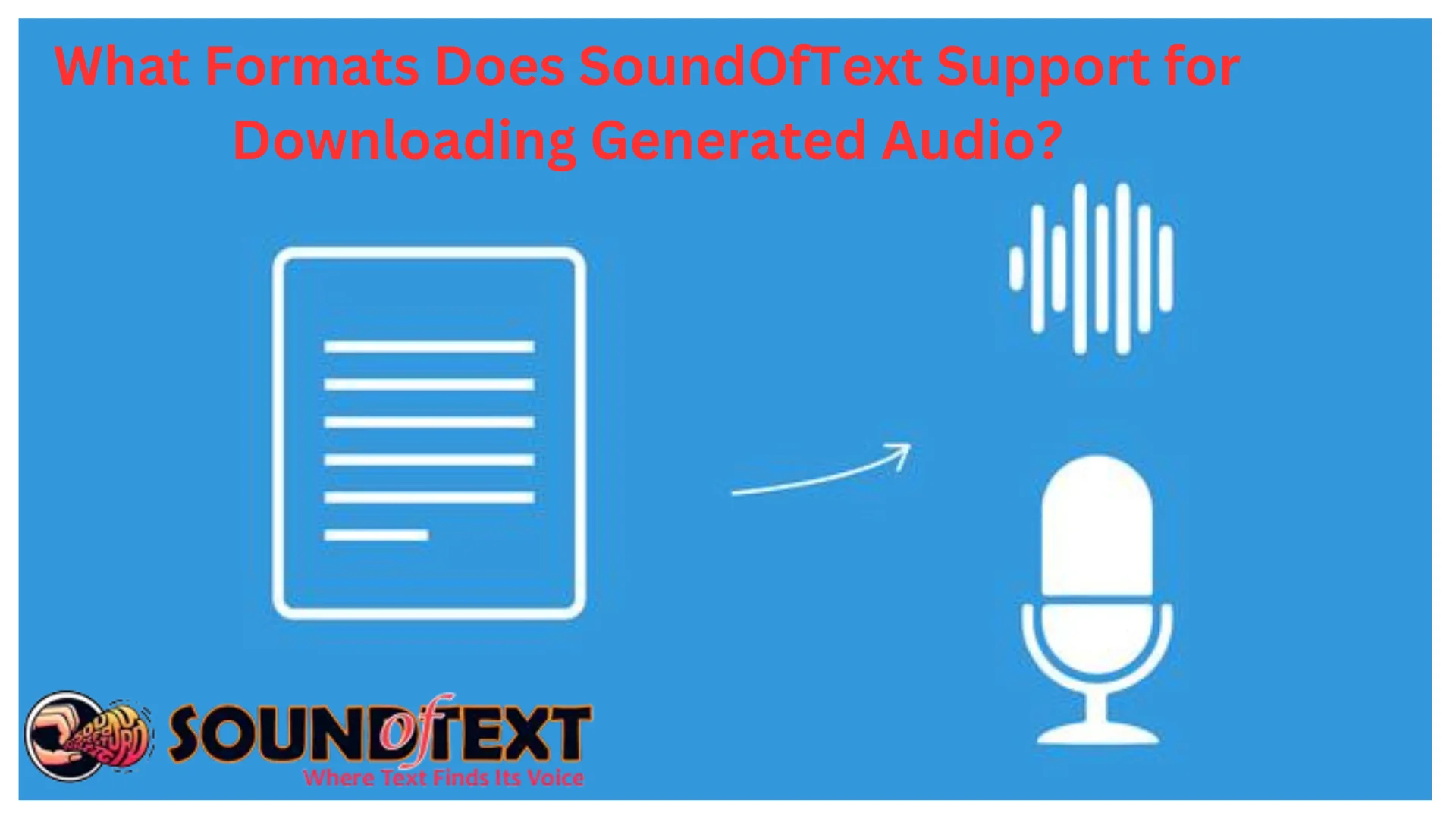SoundOfText has emerged as a groundbreaking platform for converting text to speech. One of the platform’s key capabilities is allowing users to download the generated audio in various formats to suit their needs. This article delves into the main audio formats supported by SoundOfText and examines their respective utility.
A key advantage offered by SoundOfText is the ability to download the synthesized speech in different audio formats. This expands the versatility of the platform across devices while catering to diverse quality and file size considerations.
Contents
- 1 Significance of Multiple Audio Formats
- 2 Audio Formats Supported by SoundOfText
- 3 MP3
- 4 WAV
- 5 OGG
- 6 FLAC
- 7 Practical Applications Across Formats
- 8 Downloading Audio from SoundOfText
- 9 SoundOfText Audio in Language Learning
- 10 SoundOfText Formats in Accessibility Tools
- 11 Future Potential for Additional Formats
Significance of Multiple Audio Formats
The option to download audio in different formats is a crucial capability provided by text-to-speech solutions like SoundOfText. The appropriate format depends significantly on the intended application. Key factors to consider include:
- Compatibility with target playback devices
- Audio quality parameters
- File size limitations
- Compression efficiency
By supporting various formats, SoundOfText empowers users to select the optimal choice based on their priorities regarding these factors.
Audio Formats Supported by SoundOfText
SoundOfText facilitates audio downloads in four main formats: MP3, WAV, OGG, and FLAC. Each format has its own set of advantages regarding sound quality, compatibility, compression, and other parameters.
MP3
MP3 has become the most widely-adopted audio format owing to its efficient compression algorithm. Though not completely lossless, it strikes an effective balance between retaining audio quality and minimizing file size.
Key Benefits:
- Universal device compatibility – plays on almost all modern devices
- Small file size for convenient transfer and storage
- CD-level quality sufficient for most applications
WAV
WAV is an uncompressed, lossless format that preserves pristine audio quality. It produces significantly larger file sizes compared to lossy formats.
Key Benefits:
- Lossless CD/DVD-quality sound
- Ideal for editing and manipulation in production applications
- Retains original fidelity without artifacts from compression
OGG
OGG employs an open-source compression algorithm that allows efficient streaming and manipulation. It preserves quality rather effectively even at high compression levels.
Key Benefits:
- Efficient compression capability reduces file sizes
- Retains higher fidelity versus MP3 at lower bitrates
- Completely free and open format unencumbered by patents
FLAC
FLAC (Free Lossless Audio Codec) offers CD-quality audio while reducing file sizes by 40-50% relative to uncompressed formats.
Key Benefits:
- Lossless compression preserves complete fidelity
- Smaller files than WAV while retaining quality
- Wide hardware and software support
In summary, MP3 is the most compatible format, while WAV and FLAC prioritize sound quality. OGG delivers a balance through efficient open-source compression.
Practical Applications Across Formats
The choice between formats depends significantly on the intended application:
- For daily music listening, MP3 offers the best combination of convenience, quality and device support.
- Sound engineers prefer WAV when working with audio-editing applications to prevent quality loss during manipulation.
- Podcast creators often opt for OGG to prepare episodes due to efficient compression coupled with broad software support.
- Audiophiles may choose FLAC for archiving rare tracks to preserve quality while saving storage space.
Downloading Audio from SoundOfText
Downloading text-to-speech audio from SoundOfText is straightforward:
- Enter/paste the text you wish to convert
- Customize TTS parameters like voice, cadence, tone etc.
- Click Convert to Audio to preview output
- Once satisfied, click Download icon
- Select audio format – MP3, WAV, OGG or FLAC
- Download the audio file to your device!
SoundOfText Audio in Language Learning
One of the most popular applications of SoundOfText’s TTS capabilities is facilitating language learning by synthesizing educational passages.
Key examples include:
- Reinforcing comprehension through audio versions of texts
- Practicing pronunciation by focusing on speech-patterns
- Expanding vocabulary using audio flashcards for new words
- Improving listening skills via simulated conversations
Learners can amplify the impact by downloading audio in formats aligned to their learning resources and devices.
SoundOfText Formats in Accessibility Tools
SoundOfText further bolsters accessibility by enabling users with visual impairments to convert written content into synthesized speech.
Key examples include:
- Spoken narration of texts through TTS audio
- Audio augmentation of graphics via alt-text
- Navigation guidance in apps and interfaces through audio cues
Once again, easy access to multiple formats expands options to interface with different accessibility solutions.
Future Potential for Additional Formats
While SoundOfText already supports the most popular audio formats, expanding to emerging options can broaden its capabilities.
Possible future formats include:
- AAC – Successor to MP3 gaining traction
- DTS – Enables surround sound for immersive audio
- WebM – Royalty-free media format designed for web
- Opus – Open format optimized for real-time applications
Supporting such next-gen formats where viable can help SoundOfText retain the cutting edge in TTS-based audio.

